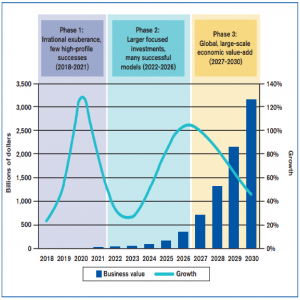Nov 28, 2018 06:28 UTC
| Updated:
Nov 28, 2018 at 06:28 UTC
WTO Report: Blockchain Deployment Could Add $3 Trillion in International Trade by 2030
The World Trade Organisation (WTO) published a report that sheds light on Blockchain’s effect on international trade on November 27. According to the study, Blockchain’s use in various sectors of international trade could add almost $3 trillion to the global economy by the year 2030.
The report, titled ‘Can Blockchain revolutionize international trade?’ looks into the issue, weighing the pros and cons of using a decentralized system in world trade. The report also considers the effect of Blockchain in sectors like finance, logistics, transportation, and customs.

Blockchain Business Value Forecast. Source: WTO
The report states that by automating much of the process and by introducing transparency in the process through digital ledgers, Blockchain could help cut down costs by a big margin. Processes like financial intermediation and exchange rate costs would be positively affected by this change. The report stated that such decentralization could pave the way for $1 trillion in new trade deals.
By delivering on its promise of transparency throughout the system and by extension, the world, Blockchain could easily help secure intellectual property (IP) rights even in places where up until now, lax laws made it impossible to prosecute counterfeiting.
Blockchain could also help in improving supply chain logistics, including tracking shipments and building trust for all parties involved. The lower costs could open up new opportunities for small and medium-sized businesses and startups.
However, the report is cautiously optimistic, warning about the downsides of using Blockchain in trade. The researchers at WTO expressed concern over energy consumption, security issues due to the multiple hacks in recent years, and the predetermined size of the blocks leading to scalability issues among other things. Addressing the issue, the report stated,
“…blockchains are highly resilient compared to traditional databases due to their decentralized and distributed nature and the use of cryptographic techniques, they are not completely immune from traditional security challenges…”
The report concludes by recommending frameworks that ensure the interoperability of networks and the provision of clear legal processes, along with the importance of taking a multi-stakeholder approach to finding appropriate uses in international trade. The report states,
“Blockchain could make international trade smarter, but smart trade requires smart standardization — and smart standardization can only happen through cooperation. If we succeed in creating an ecosystem conducive to the wider development of blockchain, international trade could well look radically different in ten to 15 years.”
Many executives, including Ethereum cofounder Vitalik Buterin have echoed the concern that the misapplication of Blockchain leads to “wasted time” in many cases. It is evident that although many companies in different industries are trying to implement Blockchain, the system may not be of much help in all of them.


























































